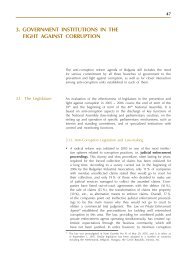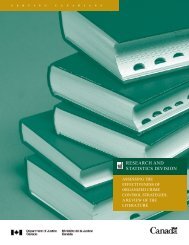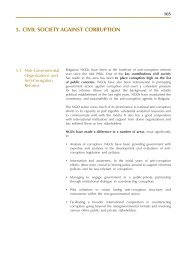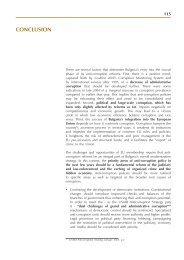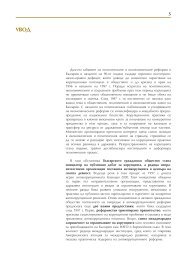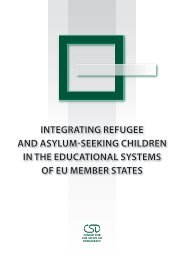National Threat Assessment 2008. Organised Crime - Politie
National Threat Assessment 2008. Organised Crime - Politie
National Threat Assessment 2008. Organised Crime - Politie
Create successful ePaper yourself
Turn your PDF publications into a flip-book with our unique Google optimized e-Paper software.
As well as being numerous and complex, laws and regulations can also be<br />
vague and inconsistent. As a result, definitions and interpretations often differ.<br />
For example, it is difficult to determine the difference between a waste material<br />
and a second-hand good. Players that do not strictly observe the rules may<br />
benefit from this lack of clarity, because if they are discovered they can easily<br />
rely on misunderstandings or differences in interpretation. As a result, their true<br />
intentions will be difficult to determine. In addition, the chance of being caught<br />
is small. Supervision, enforcement and criminal investigation agencies are facing<br />
a capacity shortage, insufficient knowledge, a lack of expertise, fragmentation<br />
and sometimes conflicting interests.<br />
Furthermore, the processing of waste has become more and more of an<br />
international phenomenon. Proper criminal investigations require international<br />
collaboration and good mutual exchange of information. In practice this is still<br />
difficult to achieve. Another complicating factor is that there are significant<br />
differences between countries in the organisation, working method and priority<br />
for enforcement and criminal investigations in relation to illegal waste streams.<br />
The effects of the new EU Regulation on the Shipment of Waste, which came<br />
into force in July 2007, are also not yet clearly visible. It is hoped that a lot of<br />
the vagueness relating to terms and the ambiguity of rules have now been<br />
removed, so that violators are no longer able to hide behind this screen.<br />
The recycling of waste is an important source of secondary raw materials.<br />
Over three quarters of white goods, brown goods and televisions are now<br />
recycled, and a great many scrap vehicles are also processed into recyclable parts<br />
or secondary raw materials. The general expectation is that the waste-processing<br />
industry will develop more and more into a fully-fledged supplier of raw<br />
materials. Most of the players will operate within the rules, but some will<br />
be involved in illegal activities on the market.<br />
Enforcement operations have had positive results in recent years: whereas over<br />
half the retailers used to hand over waste to non-certified collectors, the figure<br />
has now dropped to below 20%. To continue reaping the benefits of these<br />
operations, it is important to keep performing them and to perform them with<br />
regard to several waste streams. However, the reduction in supervision costs and<br />
the number of rules, as targeted by the government for several years, may have<br />
the opposite effect and offer more room for crime. Not all players in the waste<br />
sector will be able to handle a more hands-off government approach, which<br />
may lead to an increase in crime.<br />
The market for waste materials will probably change due to economic progress<br />
in the receiving countries. Increased wealth reduces the need to recycle waste<br />
128 <strong>National</strong> <strong>Threat</strong> <strong>Assessment</strong> 2008 – <strong>Organised</strong> crime



